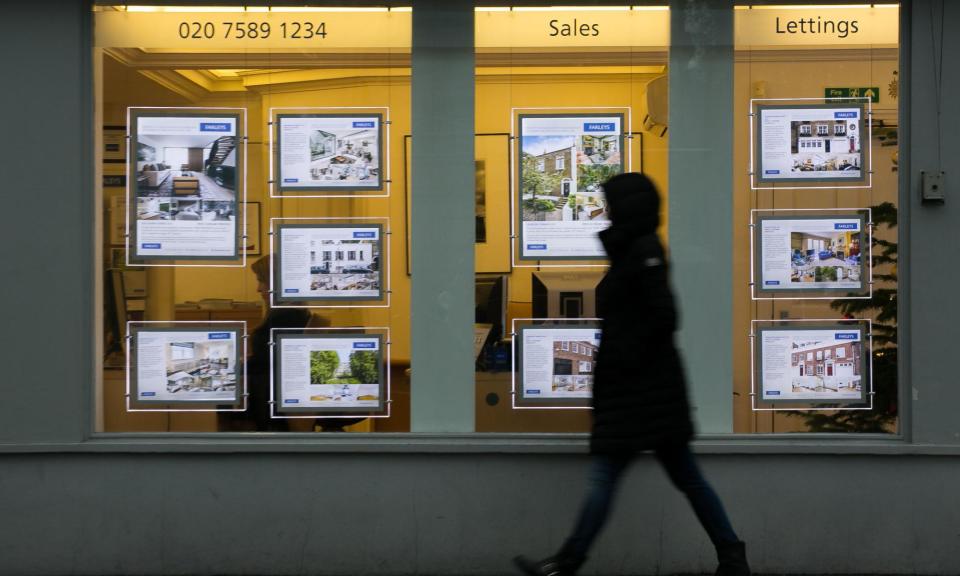Mortgage of first-time buyer tops £1,000 a month as house prices and rates rise

The monthly mortgage of a first-time buyer has soared by more than 60% to exceed £1,000 a month since the last general election, according to figures that underline the financial challenge facing Britons trying to gain a foothold on the housing ladder.
Over the last five years, the average mortgage payment for a typical first-time buyer in Great Britain has risen by 61% to £1,075 a month, up from £667 in 2019, according to the property website Rightmove.
The increase of about £400 a month is linked to the march of house prices and interest rates, which have heaped financial pressure on borrowers, whose average wages have grown by just 27% over the same period. The financial squeeze has forced many younger borrowers to either look for smaller properties or to take out an ultra-long mortgage.
“As rates have increased over the last five years, the amount that a typical first-time buyer is paying each month on a mortgage has outstripped the pace of earning growth,” said Tim Bannister, a Rightmove property expert. “Some first-time buyers are looking at extending their mortgage terms to 30 or 35 years to lower monthly payments, or looking at cheaper homes for sale so that they need to borrow less.”
Related: Are 25-year UK mortgages a thing of the past?
The calculations made various assumptions, including that first-time buyers would have a 20% deposit to put down, that their mortgage term would last 25 years and that they were taking out a five-year fixed-rate mortgage on an average rate.
The average first-time buyer home in Great Britain now costs £227,757, a 19% rise since 2019. At a regional level, the north-west has recorded the biggest jump in first-time buyer prices, at 33% since 2019 to £177,588. Prices remain highest in London, where they have grown just 6% but now stand at £507,049.
Bannister is urging the next government to support first-time buyers with “well-thought out policies” that could address the difficulties of saving up a large enough deposit and qualifying for a mortgage.
The manifestos contained a number of polices aimed at this group. The Conservatives will make the current temporary stamp duty threshold of £425,000 permanent for first-time buyers while also promising a “new and improved” help-to-buy scheme for those with small deposits. Labour says it would introduce a “permanent, comprehensive mortgage guarantee scheme”, extending the current guarantee, which supports banks to offer 95% home loans.
It comes just days after the Bank of England held interest rates at 5.25% for the seventh consecutive time, keeping borrowing costs higher for longer. Millions of homeowners have had to remortgage at much higher interest rates in the past 18 months. This has led to a collective bill that is likely to reach £12bn by the end of the year, according to the Resolution Foundation thinktank.
A survey of investors conducted by the Bank of England showed that 50% believed there would be a rate cut at the monetary policy committee meeting in August. Three-quarters of respondents to the survey said they expected a cut in September.
Separate research published today shows that average UK salaries fell slightly in May, down for the first time since last October 2023, as the job market treads water ahead of the election. The average advertised salary was £38,765 in May, which was down £45 or 0.11% on April, according to the Adzuna monthly jobs report. The number of job vacancies was little changed at 854,248, it said.
“Hopes that a return to growth [in the economy] in the first quarter would result in greater confidence in hiring were not reflected in job vacancies in May,” said the Adzuna co-founder Andrew Hunter.
“Salaries have fallen slightly month-on-month pointing to a slightly less tight labour market and perhaps indicating that companies are beginning to post more junior and entry-level roles. This is balanced by the recent news that unemployment has reached its highest level in two and a half years, at 4.4%.”

 Yahoo Finance
Yahoo Finance 